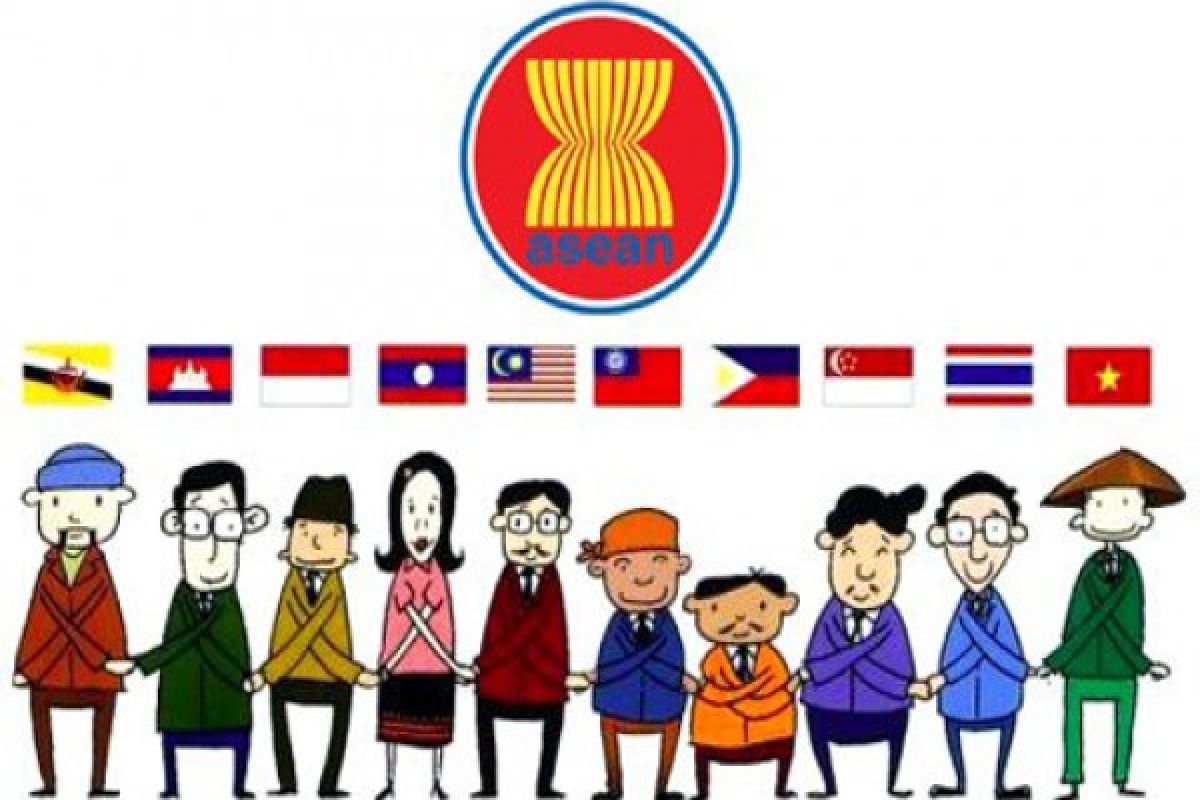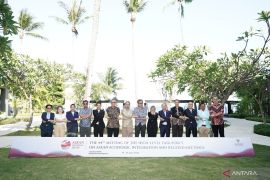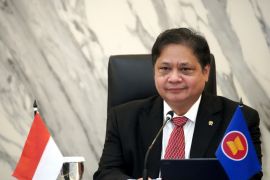Luckily, the US and EU revoked their sanctions in 2011 and 2013, respectively."Yangon (ANTARA News) - It was only 9 in the morning, but workers at the factory of Best Industrial Company Limited, a garment manufacturer, were already busy cutting and sewing fabric to be made into clothes.
This time, the factory had received an order for 340,000 football shirts from a Europe-based company, the largest it had ever had since the United States and European Union lifted sanctions on Myanmar two years ago.
"We have seen hard times. We laugh and we cry about it. But in the end we survive," said Khine Khine Nwe, the managing director of the company, while recalling the days when her factory could not operate thanks to the economic sanction gradually imposed by the United States and the European Union on Myanmar since the 1990s.
It was not until recent years when foreign companies renewed their business links with Myanmar companies.
Khine, who is also Secretary General of Myanmar Garment Manufacturers Association (MGMA), noted that in the year 1999 there were 300 to 400 textile factories in Myanmar, including sub-contract garment manufacturers such as her company.
Those companies could employ a total of 300,000 to 400,000 workers. But ever since the EU and the US imposed tighter sanctions on Myanmar in 2003, many companies were closed down and the size of the total workforce also dropped to 60,000 people.
She said the EU had not placed any sanctions on the Myanmar`s garment sector, but the image of the country took a beating at the time and dissuaded foreign companies from continuing to operate there.
"Luckily, the US and EU revoked their sanctions in 2011 and 2013, respectively. Right now, the garment industry and other industries in Myanmar are trying to get back on their feet again. We need to rush, as the ASEAN Economic Community is going to be implemented by 2015," Khine continued.
Despite those positive developments, she added, there was a concern among Myanmar entrepreneurs, especially the small and medium enterprises, that the implementation of AEC may have a negative impact on the availability of skilled human resources.
A survey, conducted last year by the Japan External Trade Organization (Jetro), about the minimum wages in 19 Asian regions having the highest concentration of Japanese investors - comprising mainland China, Hong Kong, South Korea, Taiwan, Macau, Cambodia, Indonesia, Malaysia, Myanmar, the Philippines, Singapore, Thailand, Vietnam, Laos, Bangladesh, India, Pakistan, Sri Lanka, Australia and New Zealand - showed that wages in the manufacturing industry in Myanmar were the lowest among all.
The "Survey of Japanese-Affiliated Companies in Asia and Oceania" report revealed that the average industry wage in Myanmar per year is US$1,100, while in Thailand it is $6,704, six times higher than Myanmar`s.
The wages in Vietnam are twice as high as those in Myanmar. Perhaps the closest to Myanmar`s average annual wage is that of Cambodia, at approximately $1,424. Nevertheless, according to Jetro`s survey, skilled workers such as engineers, managers or administration staff in Myanmar earn the lowest pay among their counterparts in the other 19 surveyed countries.
Judging from an investor`s point of view, this may be good news for Myanmar, as foreign entrepreneurs may be attracted to the country due to its cheap labor force. But, on the other hand, the implementation of ASEAN Economic Community in 2015 will lead to smoother flow of skilled labor in the region, which may negatively affect Myanmar.
"With the current average wage, skillful workers in Myanmar may find it more beneficial to work in other ASEAN countries. This is a threat for the development of Myanmar`s industry sector. We need those workers but we cannot give them the job conditions that they want. Hence there`s nothing we can do to stop them from fleeing the country and looking for better jobs," Khine said.
According to her the Myanmar government needs to provide a better working environment and higher salaries for workers in the country in order to ensure sustainable development of the industry.
Training programs to improve the quality of local workers are also needed in order to improve the living standards of those workers and enable them to compete with workers from other ASEAN countries, given the AEC is going to be implemented in 2015.
"This is a challenging task for the government. From an entrepreneurial perspective, we are trying to provide training to potential workers. I provide training on sewing and safety at work, with help from a local NGO, but the government needs to improve the working environment in order to retain the skilled workers in the country and encourage expatriate workers to return home," she added.
Meanwhile, Vice President of Myanmar`s Chamber of Commerce and Industry (UMFFCI) Maung Maung Lay expressed optimism about Myanmar`s readiness for the AEC in 2015, especially in terms of the competitiveness of its human resources, adding that some sectors may be negatively hit by the AEC but Myanmar can overcome the challenge.
"Myanmar is still in the process of transformation. We are not sound technically, have no capital market, are financially weak, and the quality of human resources is low. But we also have some strengths. We have a massive labor force and are rich in natural resources such as jade and other mining products," he explained.
According to Maung, the most important thing to be done right now is to improve the capacity of Myanmar`s human resources in order to meet the ASEAN standard and compete with the regional workforce.
Sharing a similar view, Pyae Sone Oo, managing director of Infinity Innovation, who handles its rice trading business in Yangon, said Myanmar needs to improve the quality of its human resources, especially of the farmers.
"Farmers account for almost 80 percent of the workforce in Myanmar. However, most farmers are still engaged in traditional farming. They do not know enough about fertilizers or how to grow good quality paddy. Therefore, the rice produced here is of low quality. As for the quality of our human resources, we are trying to catch up with other ASEAN countries, but I don`t think that it will be easy for us," he pointed out.
Currently, the Myanmar government, with the support of its neighboring countries in ASEAN, such as Indonesia, is trying to improve the quality of Myanmarese workforce. Indonesia provides Myanmar`s bureaucrats and farmers with training and agricultural machinery.
Reporter: Amie Fenia Arimbi
Editor: Priyambodo RH
Copyright © ANTARA 2013












